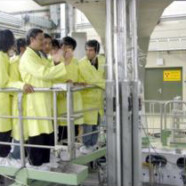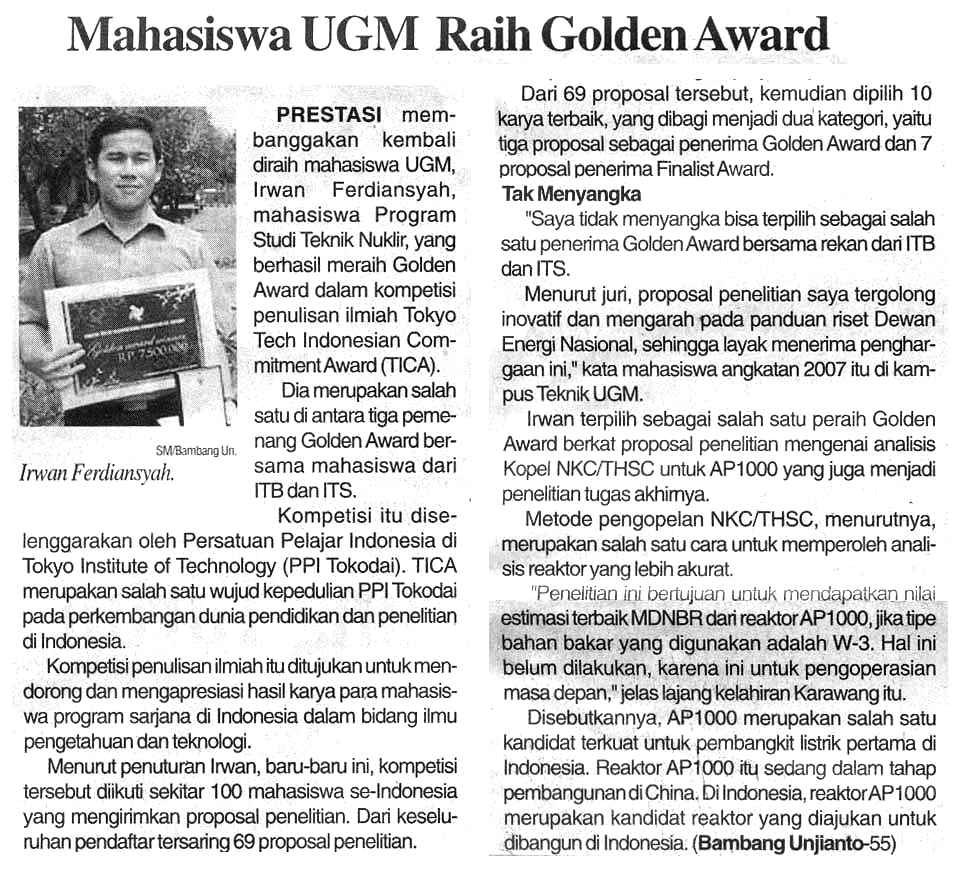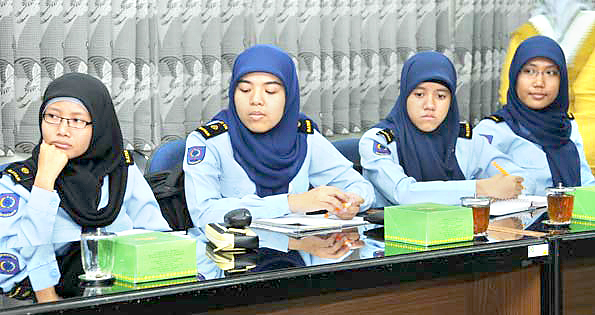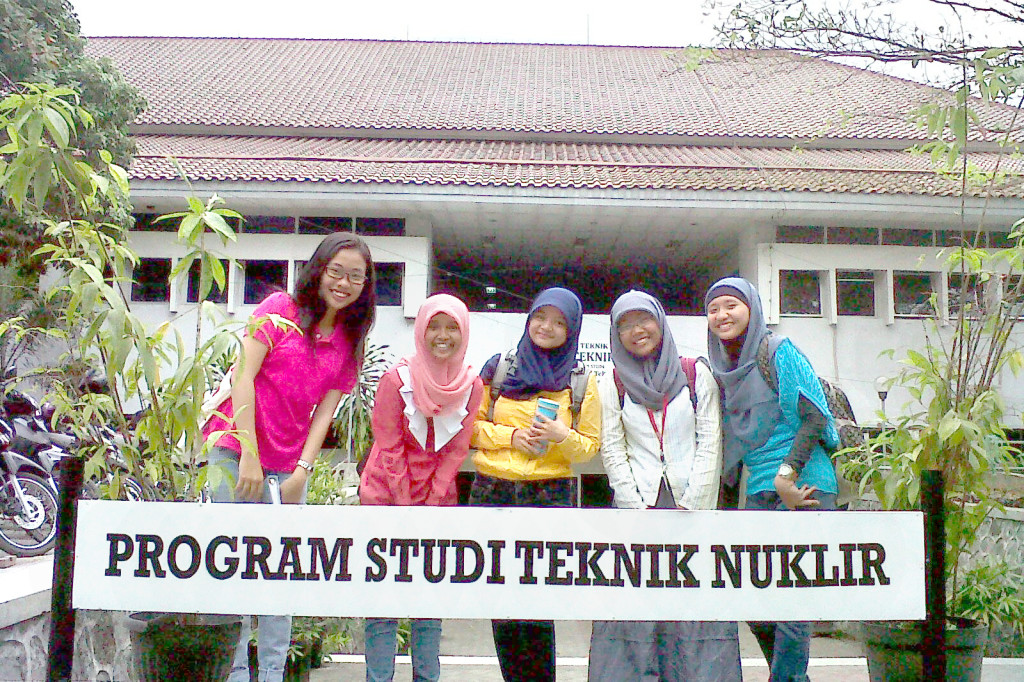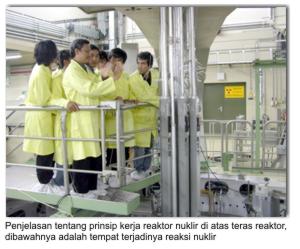Nuclear Education in Indonesia
Indonesia plans to build its first nuclear power plant (NPP) to solve the country’s energy problems. It needs fully-skilled human resources in the field of nuclear technology. The Department of Engineering Physics at Universitas Gadjah Mada, Yogyakarta, is the only university department in Indonesia offering a nuclear engineering curriculum. Since its establishment in 1977, about 890 people have graduated; more than 200 are currently studying.
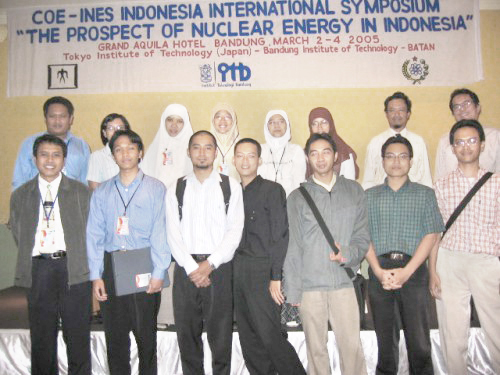
Delegasi Teknik Nuklir UGM turut ambil bagian dalam konferensi internasional bidang energi nuklir di Bandung. (courtesy Muhammad Kunta Biddinika)
The main obstacle of nuclear engineering education development is unclear government policy. Since the first nuclear research reactor was established in Bandung (1972), the government has postponed its plan several times due to the presence of anti-nuclear groups, especially after Fukushima accident.
As an education institution, Universitas Gadjah Mada has a mission to develop science and technology for leveraging the nation’s competitiveness. Nuclear engineering development has to be independent of the presence of nuclear power plants in Indonesia, since many NPPs are now being built around the world. In addition, according to the national Nuclear Energy Regulatory Agency (BAPETEN), there are 2825 institutions, including medical institutions, that are currently using radioactive materials in Indonesia. In addition, Indonesia is now playing an important role in radiopharmacy production, particularly in Asia. So there are several opportunities that could be the basis for developing the new nuclear engineering curriculum.
In the new nuclear engineering curriculum, students are offered a choice of two concentrations, nuclear energy systems and medical physics technology. The first one is oriented to support nuclear reactor system development including Gen IV NPPs, research reactors and radioisotope production reactors. Students study how to plan, operate and develop a nuclear reactor system from front-end to back-end. The second concentration is developed to be applied in the medical field, as for example to become a partner of radiooncologists in hospitals. Besides the hard skills, the student’s character has to be educated to develop excellence in safety culture, global and national vision. We believe that the hard and soft skills mentioned above will help students survive in today’s global competition, especially in nuclear technology utilization.
Nuclear power in Indonesia: a history
Nuclear technology is not new in Indonesia. In fact, an Indonesian national committee first began investigating nuclear technology in 1954 as it reviewed data from the fallout produced from several nuclear-weapon tests in the Pacific Ocean. Further, Indonesia has operated a research nuclear reactor in Bandung since 1965 (Triga Mark II). The next research reactors were built in Yogyakarta (Kartini) and Serpong (RSG GA Siwabessy). Indonesia also has built several supporting facilities for those research reactors, such as a waste-treatment facility, and a facility for fuel research and safety testing. In addition, Indonesia set up a Commission for Nuclear Power Plant Establishment Preparation in 1972 for improving the utilization of nuclear technology. During the 1980s, the Indonesian government planned to build the first NPP in the Muria area, north of Java Island. This plan, however, was stopped due to the protests from anti-nuclear groups. Their reasons for protesting the siting and construction of the reactors were the presence of radioactive waste and the management of this potentially-hazardous material.
In Indonesia’s national energy policy for 2006-2025, nuclear energy was anticipated to supply about 2% of the national energy demand (corresponding to four 1000 MWe-capacity units). Coal, natural gas and petroleum would still be the primary sources of energy (89.4%) with smaller amounts being supplied by several alternative energies including nuclear. That energy policy (presidential decree no. 7/2005) planned for the first new NPP to start construction in 2010 for operation in 2016. (Other nuclear power-related legislation includes act no. 10/1997 and 18/2002). But once again, the government was forced to postpone this plan due to additional reasons cited by the anti-nuclear groups: the recent disaster in Indonesia, especially earthquakes and the readiness of nuclear-technology personnel, with particular emphasis on the lack of discipline of Indonesians. The recent Fukushima disaster also reinforces their reason to refuse NPP. But there is still a need for NPP development in Asia. Despite the lack of progress on the power-generation side, the application of nuclear technology in other fields such as medicine, food, and industry has increased.
Although the government postponed the construction of the first nuclear power plant, the Department of Engineering Physics remains committed to preparing graduates for a future Indonesian nuclear power plant or abroad and can work in the field of nuclear technology applications such as medical physics and industry.
Other applications of nuclear technology in Indonesia
Nuclear technology in Indonesia is developing in six fields: application of isotope and radiation technology, production of isotopes and label compounds, radioactive waste management, nucleonic device and instrumentation development and production, nuclear fuel, and nuclear reactor technology.
The increasing of application of radiation technology in medicine results in increasing demand for medical physicists. Radiation safety for patients requires equipment and standard procedures, quality control, and qualified and competent personnel. So, the presence of good medical physicists in medical radiation work is nonnegotiable. Later, their career is supported by a policy of ministry of health that defines medical physicist as a health worker. The increasing number of hospitals and community health centres (PUSKESMAS, Pusat Kesehatan Masyarakat-Community Health Centre) — 4.5% per year from 2004 until 2009 — will also increase the need for medical physicists to control the quality of x-ray equipment operation. Further, the demand of radiopharmaceuticals (Tc-99m) at 22 national hospitals and abroad has also been increasing for cancer treatment.
Nuclear technology intervention for improving of food quality by irradiation techniques is important in order to face food problems.
Today, food security is a main concern in Indonesia due to the reduction in availability of arable land. Nuclear technology intervention for improving of food quality by irradiation techniques is important in order to face food problems. About 40 food companies irradiate their products at the irradiator at National Nuclear Power Agency (BATAN)’s Centre for Isotopes and Radiation Application in Jakarta.
Increasing radioisotope utilization will increase the need for non-power nuclear reactor development for isotope production. Most isotope production reactors are aging and their production ability is decreasing. New innovations for isotope production nuclear research reactors have pretty good prospects. So, nuclear reactor knowledge is still needed in line with the development of nuclear technology applications in the Indonesian industry.
Based on our tracer study, most of the graduates of our nuclear engineering curriculum are working on either national or international companies outside of the nuclear field, such as petroleum and oil, electricity, drinking water and heavy equipment. Despite this, their careers have been good. That may because the systems used in nuclear engineering, especially safety and quality systems, could be applied in other fields.
The global challenge of safety, security, climate change and environmental degradation need to be considered and positioned as educational challenges as well. Safety as a trademark of nuclear industry should be maintained and improved to achieve an environmentally-friendly industry, and there should be an assurance for sustainability in its widest sense. Furthermore, 3S (safeguards, safety and security) issues, which are IAEA’s concern today, should also be reflected in the nuclear education curriculum.
Post-Fukushima issues
The Fukushima Daiichi accident has reduced the popularity of nuclear energy as a reliable energy source choice around the world. Public attention on the safety of nuclear reactors has increased. In Indonesia, the incident has also provided additional reasons for Indonesian anti-nuclear groups to push for the elimination of nuclear energy from the national energy policy. The protesters are supported by some of the media who always portray nuclear energy in a negative way. News from abroad is frequently translated incorrectly due to the lack of knowledge about nuclear technology, adding further confusion and misperception. At the same time, Indonesian government nuclear bodies made no quick responses to the accident as an official judgement.
But on the positive side, the Fukushima accident has increased the public’s curiosity about nuclear energy. For a few weeks after the Fukushima accident, the national media (for example, newspapers, TV and magazines) headlined every piece of news related to nuclear technology, especially about nuclear safety. This turn of events has resulted in some researchers and experts from university and Indonesian nuclear government bodies (BATAN and BAPETEN) being asked to explain nuclear technology to the public. These experts show that the basic design of the Fukushima Daiichi reactors survived an earthquake larger than the plants’ original design basis (although the tsunami was another matter). Support for building an NPP in Indonesia to fulfil future energy demands has come from the Muslim Scholars Association in Indonesia (ICMI). It also supported renewables, and stipulated that site selection is vital to minimize risks from an extreme natural event. A 2012 online media poll found respondents strongly in favour of nuclear, 56%-36% [7].
The recent success story of PT. Batan Teknologi (Persero), a state-owned enterprise, as an Asian leader in radioisotope production for national and international uses, shows the value of nuclear technology. This company uses samples irradiated at the Serpong reactor.
The new curriculum
As an educational institution, Universitas Gadjah Mada has a mission to develop science and technology to leverage the nation’s competitiveness. According to that goal, development of nuclear engineering has to be independent of the presence of NPPs in Indonesia, since many NPPs are being developed worldwide. In addition, the application of nuclear technology in other fields has been increasing. Based on the current challenges and opportunities, Universitas Gadjah Mada redesigned the curriculum of nuclear engineering in 2011 in order to enhance students’ capabilities.
Competences developed in the new curriculum are based on ABET (Accreditation Board for Engineering and Technology) and EEDP Curriculum Development for Under Graduate Programs in Indonesia for aligning the graduate’s competence to the national and international needs.
The competency developed could be divided into hard skills and soft skills. Hard skills include mastering the basic knowledge of mathematics, science and engineering; mastering the fundamental knowledge of nuclear engineering; designing nuclear engineering systems; mastering the application of nuclear technology in medicine; and mastering sustainable nuclear industry ecology. Soft skills include: integrating systems, good communication, professional ethics, prudence, discipline, and so on. Basic engineering and nuclear engineering courses contribute 77.77% of the total credits required. Students have to take the rest (22.22%) after they determine their specialism in either nuclear energy technology or medical physics.
All nuclear engineering students are required to take between 144 and 148 units of credit in order to complete the requirement for Bachelor of Engineering degree. The courses consist of mandatory courses (112 credits) and elective courses (32 credits) that are spread into an eight-semester programme. There are nine laboratory courses. Since 2004, the university has shifted the teaching method from teacher-centred learning to student-centred learning using techniques such as problem-based learning, collaborative learning and cooperative learning. We are also implementing a new teaching delivery method called research-based learning that requires a lecturer to integrate research into the learning process. In addition, students are required to do a month-long internship or industrial training (two credits) and two months’ community empowerment program field practice (three credits) before finishing the study. In the last semester students have to work on a final project (four credits) and defend their project report in an oral examination (two credits). Students take on average 4.1 years to finish their studies.
The absence of NPPs in Indonesia is an obstacle for students to imagine the real application of their knowledge. Computer simulation programmes and guest lecturers (either national or foreign) are helpful to overcome these obstacles. Nuclear Reactor Physics lab work for students who choose the nuclear reactor system concentration is conducted in the Yogyakarta research reactor under the guidance of BATAN staff.
Since the obstacles of NPP construction in Indonesia are radioactive waste management and reactor safety, the curriculum emphasizes dealing with these issues; radioactive waste management and safety engineering courses become a compulsory subject for all students who are interested in nuclear energy technology. Research projects in the department related to radioactive waste management and safer reactor design have also been encouraged. The utilization of research reactors for radioisotope production, conducted in Indonesia since 1968, also enriches our insight on the utilization of nuclear energy.
Since the medical physics coursework is related to human health, it is developed under collaboration with the medical faculty of Universitas Gadjah Mada and Sardjito Hospital. This cooperation helps students learn basic sciences related to the work of medical physicists, as well as health ethics. Residencies have to be conducted at the hospital under guidance of a doctor and medical physicist. For this specialization, safety remains a concern, although in the form of soft skills in order to effectively build a safety culture.
Safeguards are designed as an elective course that could be taken by all students in both interests. The topic of security is currently being developed in the form of hidden curriculum in order to build security culture among students. The enrichment of the curriculum with security topics is also supported by PNS (USA) and IAEA.
To improve nuclear technology dissemination in order to give balanced information about nuclear risk and benefit to the people, the department cooperates with BATAN. Through KKN PPM (Community Empowerment Programme Field Practice) and community empowerment activities, nuclear technology applications in agriculture and animal husbandry are taught to farmers, breeders, elementary and high school students. By contacting and communicating with people, the student’s soft skills are built. Students are also encouraged to enhance their character through student exchange as well as national competitions and international competitions in writing or experimental work.
Source: Nuclear Engineering International
By Susetyo Hario Putero, Widya Rosita, Fnu Sihana, Haryono Budi Santosa and Anung Muharini

